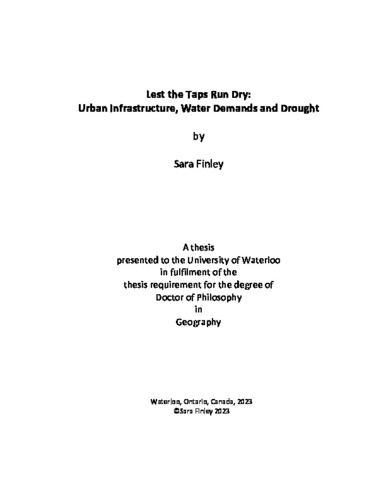| dc.contributor.author | Finley, Sara | |
| dc.date.accessioned | 2024-01-05 16:50:26 (GMT) | |
| dc.date.available | 2024-01-05 16:50:26 (GMT) | |
| dc.date.issued | 2024-01-05 | |
| dc.date.submitted | 2023-12-18 | |
| dc.identifier.uri | http://hdl.handle.net/10012/20215 | |
| dc.description.abstract | Hydrologically-driven urban water shortage situations (urban droughts) are becoming increasingly widespread under the combined forces of urbanization and global climate change. Canadian cities are not exempted from these worries: though most parts of the country receive abundant rainfall on an annual basis, summer droughts driven by sub-annual periods of low relative precipitation or snowmelt anomalies are commonplace in different parts of the country. In cities where climate-sensitive water use is widespread, summer drought conditions can be accompanied by upward swings in municipal water demands in response to hot, dry weather; this combination of reduced supply and surging demand can increase cities’ vulnerability to urban drought on a range of timescales.
The research presented in this thesis seeks to evaluate and quantify the role of water demand dynamics in driving urban drought conditions in Canada. It employs a combination of literature and case study review, conceptual exploration, and quantitative analysis of water demand data collected from 15 Canadian cities to assess the degree to which water demand fluctuations can contribute to urban water shortage threats across the country. The research begins with a conceptual review of urban drought and the endogenous drivers that influence its impacts, finding that the experience of drought in the urban context is uniquely dependent on the response actions of water managers and water users who provide the driving force behind short-term changes in demand intended to mitigate drought impacts within the urban system. Next, the analysis shifts to an evaluation of the role of summer water use bylaws imposed in Canadian cities in mitigating short-term increases in urban water demand during the summer months, revealing that these restrictions have little overall impact on seasonal water demand patterns, though the most stringent formats did show some demand dampening effects during short-term periods of exceptionally hot, dry summer weather. The research program concludes with an in-depth analysis of long-term climate and water demand datasets to detect shifts in urban water demand during summer periods of meteorological drought in Canadian cities. This analysis revealed that summer drought periods are indeed strongly correlated with excess summer water demands, though maximum summer temperatures were more influential than drought condition in most cases.
Results from the research presented in this thesis suggest that water demands in Canadian cities tend to surge during summer periods of hot and drought-like conditions, thus aggravating the strained supply:demand relationship that drives urban water shortage threats. While findings confirm that the actions of water managers and water users are highly influential in mitigating urban drought impacts, quantitative data analysis finds no indication that the types of seasonal water restrictions commonly imposed in Canadian cities are effective in reducing climate-driven surges in water demand. | en |
| dc.language.iso | en | en |
| dc.publisher | University of Waterloo | en |
| dc.subject | water | en |
| dc.subject | drought | en |
| dc.subject | cities | en |
| dc.subject | water demand | en |
| dc.subject | urban irrigation | en |
| dc.title | Lest the Taps Run Dry: Urban Infrastructure, Water Demands and Drought | en |
| dc.type | Doctoral Thesis | en |
| dc.pending | false | |
| uws-etd.degree.department | Geography and Environmental Management | en |
| uws-etd.degree.discipline | Geography | en |
| uws-etd.degree.grantor | University of Waterloo | en |
| uws-etd.degree | Doctor of Philosophy | en |
| uws-etd.embargo.terms | 0 | en |
| uws.contributor.advisor | Murphy, Stephen | |
| uws.contributor.affiliation1 | Faculty of Environment | en |
| uws.published.city | Waterloo | en |
| uws.published.country | Canada | en |
| uws.published.province | Ontario | en |
| uws.typeOfResource | Text | en |
| uws.peerReviewStatus | Unreviewed | en |
| uws.scholarLevel | Graduate | en |

